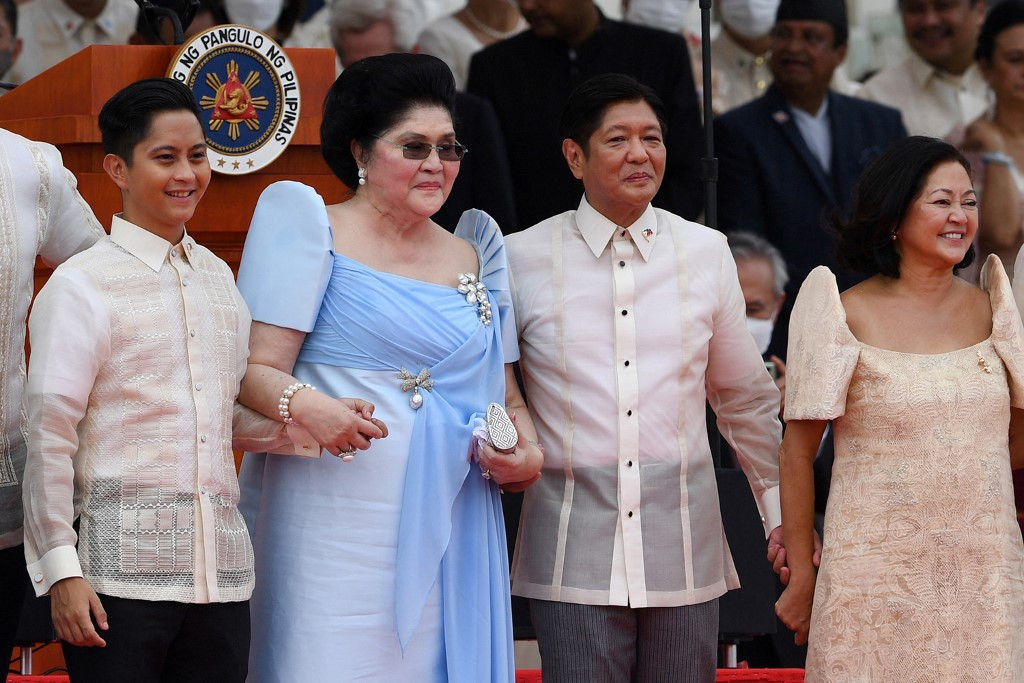Popular Reads
Top Results
Can't find what you're looking for?
View all search resultsPopular Reads
Top Results
Can't find what you're looking for?
View all search resultsMarcos Jr and ASEAN
Marcos Jr will likely continue to pursue pragmatic ties with China, the Philippines’ most important trading partner, although this will be disappointing for the military and his domestic audience.
Change text size
Gift Premium Articles
to Anyone
 Former first lady Imelda Marcos (second left) holds hands with her son, the new Philippine President Ferdinand Marcos Jr. (second right), as they stand with family members after he took his oath of office, during the inauguration ceremony at the National Museum in Manila on June 30, 2022. (AFP/Ted Aljibe)
Former first lady Imelda Marcos (second left) holds hands with her son, the new Philippine President Ferdinand Marcos Jr. (second right), as they stand with family members after he took his oath of office, during the inauguration ceremony at the National Museum in Manila on June 30, 2022. (AFP/Ted Aljibe)
F
erdinand “Bongbong” Marcos Jr and Sara Duterte have now assumed office as the president and vice president, respectively, of the Philippines. The Philippine people have entrusted the duo to lead the nation to a better life for the next six years.
On the foreign policy front, one of the toughest challenges for the archipelagic nation is how it can contribute to maintaining peace and stability in the region, especially when tension among big powers is escalating. In this regard, the Philippines, like several other ASEAN member countries, has to deal with China, as the two have overlapping sovereignty claims in the South China Sea.
President Marcos Jr needs to prioritize normalizing the Philippines’ relationship with ASEAN. In the last six years under then-president Rodrigo Duterte, the country distanced itself from the regional bloc. His open refusal to attend the ASEAN emergency summit to discuss the latest situation in Myanmar on April 24, 2021 was one of the most blatant examples of Duterte’s “self- expulsion” from ASEAN. His brutal actions against criminals, drug dealers and the opposition were often used as excuses by regional leaders to avoid getting closer to him.
Marcos Jr holds a great opportunity to reinvigorate the Philippines’ intensive participation in the regional grouping, which his father cofounded back in 1967. With a population of more than 113 million, the Philippines is the second-most populous nation in ASEAN after Indonesia. Traditionally the country has close relations with its former colonial master, the United States. Despite their up and down relations under Duterte, the country remains one of the US’ closest allies in Asia after Japan and South Korea.
Its military alliance with the US is strategically important not just for the Philippines in the face of a more assertive China, but also for ASEAN. The region has seen rising tension that has spread to the Indo-Pacific, prompting more major powers like France and the United Kingdom, to enter the territory along with their own strategies.
Marcos Jr is likely to continue to pursue pragmatic ties with China, the Philippines’ most important trading partner, although this will be disappointing for the military and his domestic audience. During his six-year term, Duterte openly opted for a pragmatic relationship with China mainly for economic interests, with an unrealistic hope that China would soften its stance on the overlapping claim in the South China Sea.
Along with Indonesia, Thailand, Singapore and Malaysia, the Philippines is a founding member of ASEAN when it was established on Aug. 8, 1967, in Bangkok. The Philippines is the oldest democracy in the region, after the “people’s power” revolution that forced then-president Ferdinand Marcos and his family, including Marcos Jr, to flee to the US in February 1986.
The former first family was easily able to return to Manila in 1991 and started to rebuild their political dynasty. Before his election to the presidency, Marcos, as well as his siblings and mother Imelda, held various political positions.
While welcoming President Marcos Jr, ASEAN expects the new Philippine leader to play more active roles than his predecessor on ASEAN affairs for the sake of the region’s peace and stability and the country’s national interests.










